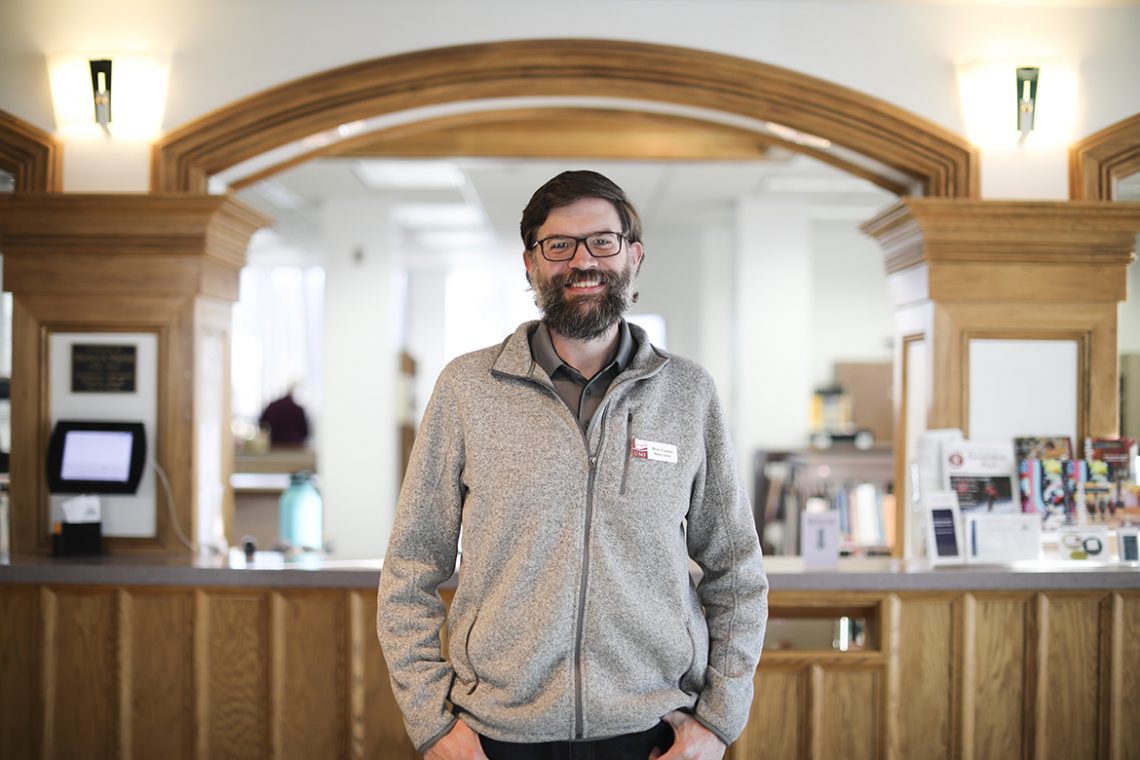In this month’s missive from a member of the University’s leadership team, Library Director Bryce Cundick explains how Mantor Library’s appearance, resources, and services evolve to meet the needs of contemporary students.
Dear Alumni and Friends of UMF,
When I mention the words “Mantor Library,” what images come to mind for you? Late-night study sessions with your books strewn across a table or perhaps getting lost amid the veritable maze of bookshelves and staircases of the building? Many people assume libraries are a constant — that we’re still hardbound places of learning and books and librarians constantly asking you to be quiet.
It’s no wonder, then, that so many people can’t quite believe their eyes when they walk into Mantor these days, especially if it’s their first time back in a few years. They’re met not with a cathedral-esque atmosphere, but with a vibrant coffee bar directly opposite the library help desk (now a technology help desk as well). The quiet study area of the reference section on the main floor was transformed into a thriving student learning commons several years ago. The rows upon rows of bookshelves on the second floor have been replaced by a wide-open quiet study space that sometimes transitions to a lecture hall or a reception room.

UMF Library Director Bryce Cundick. (Photo by Marc Glass.)
This has been a transition that hasn’t been entirely bump-free. We realize that to many, the definition of “library” became intrinsically associated with the concepts of “books.” Some began to question if Mantor Library wasn’t losing its way, somehow, attracted by the latest trends and flash-in-the-pan concepts. After all, we’ve even added a MakerSpace this past spring, a spot where UMF patrons can design and print in 3D. Some feared the library would be overwhelmed — that there wouldn’t be a space to study in the building anymore at all.
But libraries have always been about more than books. They’ve been about information: how to find it, how to store it, how to consume it, and how to share it. When the famous Library of Alexandria existed, information would have been found on scrolls, not books. But whether the information is encased in paper and ink or digital bits, libraries are here ready to help people manage it — something that’s become more important than ever in these days of information overload.
And really, Mantor has been changing all the time. Card catalogs gave way to the computer. Microfilm machines are now digital, letting you scan and email and enhance old newspaper articles in ways people couldn’t have dreamed of 50 years ago. VHS was replaced by DVD, and now we have streaming video as well. Print journals are almost entirely accessed via the Internet these days. The way we interact with information has fundamentally changed, and so it only makes sense that libraries would change as well.
We have technology available for checkout now: Chromebooks, Macs, PCs, digital video cameras, dongles, power adapters, and more. We added Scholar Works, a new digital repository where you can find everything from UMF yearbooks to cookbooks to faculty publications and student research. It opens up those items to Google searches, which, in turn, brings them before a worldwide audience.
So if you haven’t been to Mantor in a while, please swing by and visit. You can get a community account for free, grab something to eat or drink at the cafe, and head out to the stacks to find a book or a free computer. Or if you’re not in the area anymore, drop by the library website to see what’s changed. Libraries are as vibrant as ever. Come check us out!
Bryce Cundick
Library Director, the University of Maine at Farmington
Cundick earned his bachelor’s in English and Linguistics from Brigham Young University, followed by a master’s in English from the same institution. He received his master’s of library science from Florida State University before coming to work at UMF, originally as the IT Librarian. He has served as the President of the Maine Library Association and in various other leadership positions in Maine’s library community.

